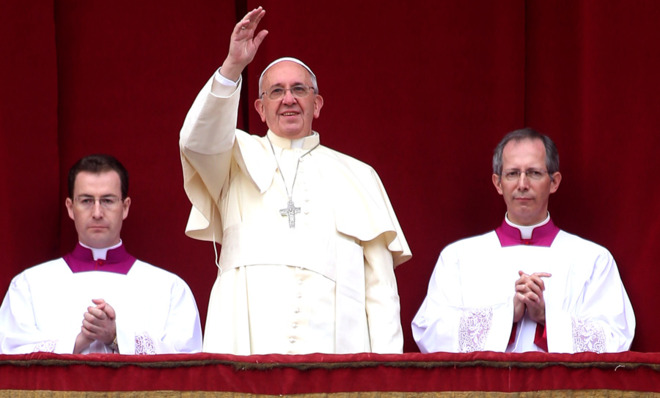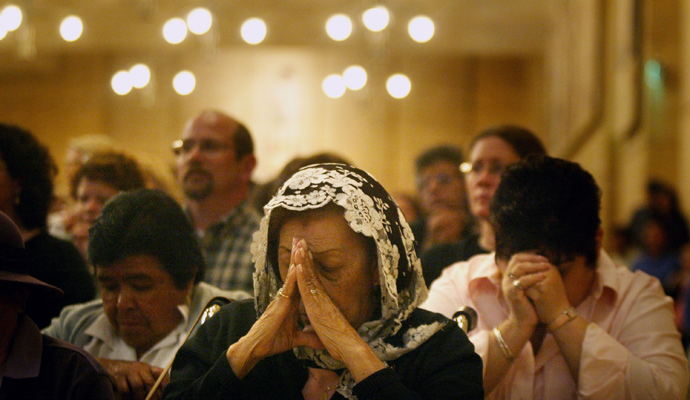What do liberal Catholics want?
Pope Francis isn't leading a wave of doctrinal reform. Yet liberals seem perfectly content.


A free daily email with the biggest news stories of the day – and the best features from TheWeek.com
You are now subscribed
Your newsletter sign-up was successful
A few months ago, I wrote a cover story for The New Republic about Pope Francis, assessing what reforms, if any, we could expect from the Roman Catholic Church under his leadership. I was impressed with the new pontiff's gestures of modesty and expressions of loving acceptance for all — for gays ("Who am I to judge?"), for Muslims, for atheists, and especially for the poor. I also took note of early signs that Francis would attempt significant reform of the Vatican bureaucracy (the Curia).
I was far more skeptical that the new pope would attempt to reform or revise church doctrine in a liberal direction — permitting married priests, easing restrictions on abortion or gay marriage, ordaining women. While it was conceivable that Francis might push to strike down the celibacy requirement for priests, it wasn't likely. And as for the other doctrinal reforms, they just weren't going to happen. There are simply too many institutional obstacles to that kind of fundamental change in the church.
Liberals would therefore have to settle for a moderation of papal rhetoric, and little else. I concluded by noting that although rhetoric matters in religion, this was far less than most liberal Catholics were hoping for.
The Week
Escape your echo chamber. Get the facts behind the news, plus analysis from multiple perspectives.

Sign up for The Week's Free Newsletters
From our morning news briefing to a weekly Good News Newsletter, get the best of The Week delivered directly to your inbox.
From our morning news briefing to a weekly Good News Newsletter, get the best of The Week delivered directly to your inbox.
But now I'm not so sure. Not about the pope's focus on reforming the Curia. Not about the importance of his rhetorical shift away from policing sexuality and toward economic injustice. And not about the unlikelihood of him pursuing liberal reform of Catholic doctrine. Nothing in the past few months, including the New York Times' splashy front page story this week, has led me to change my mind or revise my analysis — except in one respect.
After reading an endless stream of gushing commentary by liberal Catholics on Pope Francis, I'm beginning to wonder if they ever really cared about reforming doctrine in the first place.
The seeds of doubt were planted a couple of weeks after my TNR essay was published, when I appeared on an NPR radio show to discuss the pope. I repeated my argument, but then a caller challenged me. Describing herself as a progressive Catholic, she dismissed my skepticism about the likelihood of Francis reforming church doctrine. "Doctrine for a Catholic, now, is not even an issue," said Trish from Kentucky (you can listen to her beginning at 24:43). "Catholics do not care about doctrine," she said, adding, "It's irrelevant. It's a non-issue for Catholics."
That, to be honest, is something that I hadn't considered when I wrote my essay. As I indicated in my remarks responding to Trish, I had assumed all along that liberal Catholics wanted to liberalize Catholic doctrine — that they wanted to bring the church, as I wrote in TNR, "into conformity with the egalitarian ethos of modern liberalism, including its embrace of gay rights, sexual freedom, and gender equality."
A free daily email with the biggest news stories of the day – and the best features from TheWeek.com
But here was a liberal Catholic telling me I'd gotten it all wrong. The pope's warm, welcoming words are "everything," Trish said, because doctrine, including that covering contraception and divorce, is "useless."
"The congregation does not care," she declaimed.

Is Trish right? To judge by the passionate intensity of liberal response to Francis over the past few months, despite the fact that he's done nothing at all to change or reform the church's teachings, I suspect she might be. And that's an interesting development that raises important questions for the Catholic Church in the United States — and, I suspect, throughout much of the Western world.
Consider what Trish might have said. She could have said that she feels a tension between the pope's warm and welcoming statements and the church's doctrines on contraception and divorce. She could have said that, when she reflects on that tension, her conscience tells her that the pope's words are closer to Christ's teaching, and so she will be praying that the church eventually revises its doctrines to conform to the truth as she and Pope Francis (she likes to believe) see it.
But Trish doesn't hold this view. She's completely indifferent to what the church teaches across a range of topics, and she thinks her fellow American Catholics agree with her.
For all I know, many or even most liberal Catholics hope and pray for doctrinal reform. But what if Trish is right? If so, the question I'd want to ask these liberals is: Why do you continue to attend church and think of yourself as a Catholic?
If you attend for the beauty of the liturgy, why not just become an Episcopalian? If it's the sense of community you crave, why not join the Unitarian church? Either way, you could certainly continue to be spiritually moved by the pope's public utterances, in the same way you might be stirred by an inspiring presidential speech.
But what's the point of staying put when you're utterly indifferent to so much of what the Catholic Church (and on contraception at least, pretty much only the Catholic Church) proclaims to be true?
The answer matters because of what it might portend about the future of the church. Maybe Trish, a cradle Catholic, has a sentimental attachment to the church. But what about her children, presumably raised to believe that Catholic doctrine is "useless"? Will they remain Catholics and choose to raise their children in the church? I'd be surprised, frankly, if they did.
Upholding church doctrine and affirming it as true, in the style of conservative Catholics, is one thing. Fighting to change church doctrine, as my perhaps imaginary liberal Catholic reformers would want to do, is another. But treating doctrine as completely beside the point is something else entirely.
If Trish is the future of American Catholicism, we appear to be left with a puzzle: When does a church without a doctrine cease to be a church at all?
Damon Linker is a senior correspondent at TheWeek.com. He is also a former contributing editor at The New Republic and the author of The Theocons and The Religious Test.
